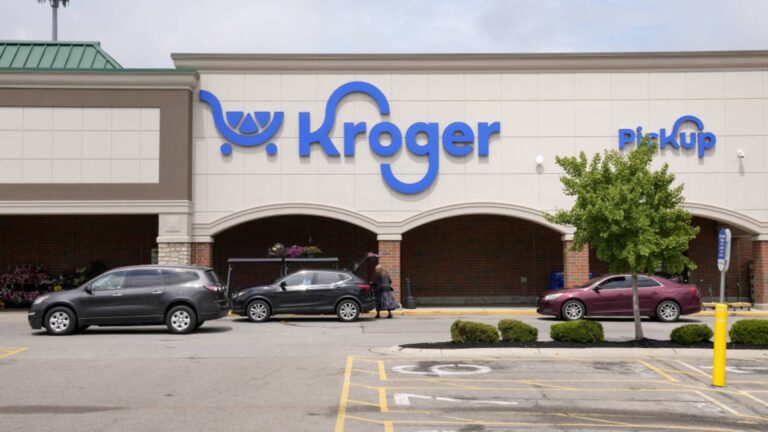Shares of Kroger rose about 9% on Friday as the supermarket operator raised its full-year sales outlook and said it’s drawing shoppers seeking lower-priced store brands and cheaper alternatives to dining out.
The Cincinnati-based grocer said it now expects identical sales, excluding fuel, to increase by 2.25% and 3.25% year over year, higher than its previous expectations for an increase of between 2% and 3%. Identical sales is an industry-specific metric that takes out one-time factors, such as store openings, closures and renovations. Kroger include stores and delivery sales in regions that have been in operation for five full quarters in identical sales.
So far this year, shares of Kroger are up nearly 16%, outpacing the approximately 1% gains of the S&P 500 during the same period.
Here’s how the company did for the fiscal first quarter compared with Wall Street’s estimates, according to a survey of analysts by LSEG:
Earnings per share: $1.49 per share, adjusted vs. $1.46 expectedRevenue: $45.12 billion vs. $45.19 billion
In the three-month period that ended May 24, Kroger’s net sales were $866 million, or $1.29 per share.
Identical sales, excluding fuel, rose 3.2% compared to the year-ago period, with growth coming from pharmacy, e-commerce and fresh groceries. The company’s e-commerce sales grew by 15% year over year.
Kroger, which owns supermarket banners across the country, has gone through significant changes over the past year. A judge blocked its $25 million acquisition of competitor Albertsons in December. Longtime CEO Rodney McMullen resigned in March after a company investigation into his personal conduct. And the company’s legal battle with Albertsons over the demise of the merger deal is ongoing.
The company also recently hired a new CFO, David Kennerley, formerly the chief financial officer for PepsiCo Europe, after its former CFO Gary Millerchip left for Costco.
On top of company-specific challenges, Kroger faces stiffer competition from Walmart and Costco — particularly as shoppers spend cautiously and watch prices closely because of tariff uncertainty.
On an earnings call with analysts on Friday, interim CEO Ron Sargent said Kroger is trying to cater to value-minded shoppers by simplifying its promotions, lowering prices on more than 2,000 products so far this year and emphasizing its private brands that tend to cost less.
“Many customers want more value, and as a result, they’re buying more promotional products and more of our brand’s products,” he said. “They’re also eating more meals at home.”
He said the company has seen a jump in shoppers buying larger pack sizes, using coupons more and buying fewer discretionary items such as snacks and adult beverages.
Kroger’s private labels, which tend to be cheaper than name-brand national brands, have been a growth driver as well. For the seventh consecutive quarter, Sargent said Kroger’s own brands grew faster than national brands. Its top two brands were Kroger’s more premium-focused brands: Simple Truth, its line of organic items, and Private Selection, which includes gourmet and artisan-inspired items like brioche dinner rolls and lobster mac and cheese.
Sargent said Kroger will try to build on that momentum — and health trends it’s seeing — by launching 80 new protein products to its Simple Truth line, including protein bars and shakes.
As a grocer that sells many food items from the U.S., Sargent said Kroger isn’t as impacted by higher tariffs on imports from across the globe as other companies. Yet in places where it does import goods, such as fruit and vegetables or flowers, he said it is “proactively looking for ways to avoid raising prices for our customers, and we consider price changes as a last resort.”
“Tariffs have not had a material impact on our business so far. And given what we know today, we do not expect them to going forward,” he said.
Kroger is also taking a hard look at its costs so it can modernize its business and get its e-commerce business closer to profitability, Kennerley said on the earnings call. The e-commerce business, a combination of curbside pickup and deliveries to customers’ doors, is not yet profitable.
The company said Friday that it will close about 60 stores over the next 18 months, which led to a $100 million impairment charge in the first quarter.
Sargent said the company had paused its annual store review during the merger process and not all of its stores are “delivering the sustainable results we need,” so now it’s catching up with closing unprofitable stores. Still, he said, even as it’s shuttering stores, Kroger plans to open new locations in higher-growth parts of the country and will accelerate those openings in 2026.
Kroger continues to search for its next CEO. Sargent said the company’s board is working with a search firm, but does not yet have an update.


